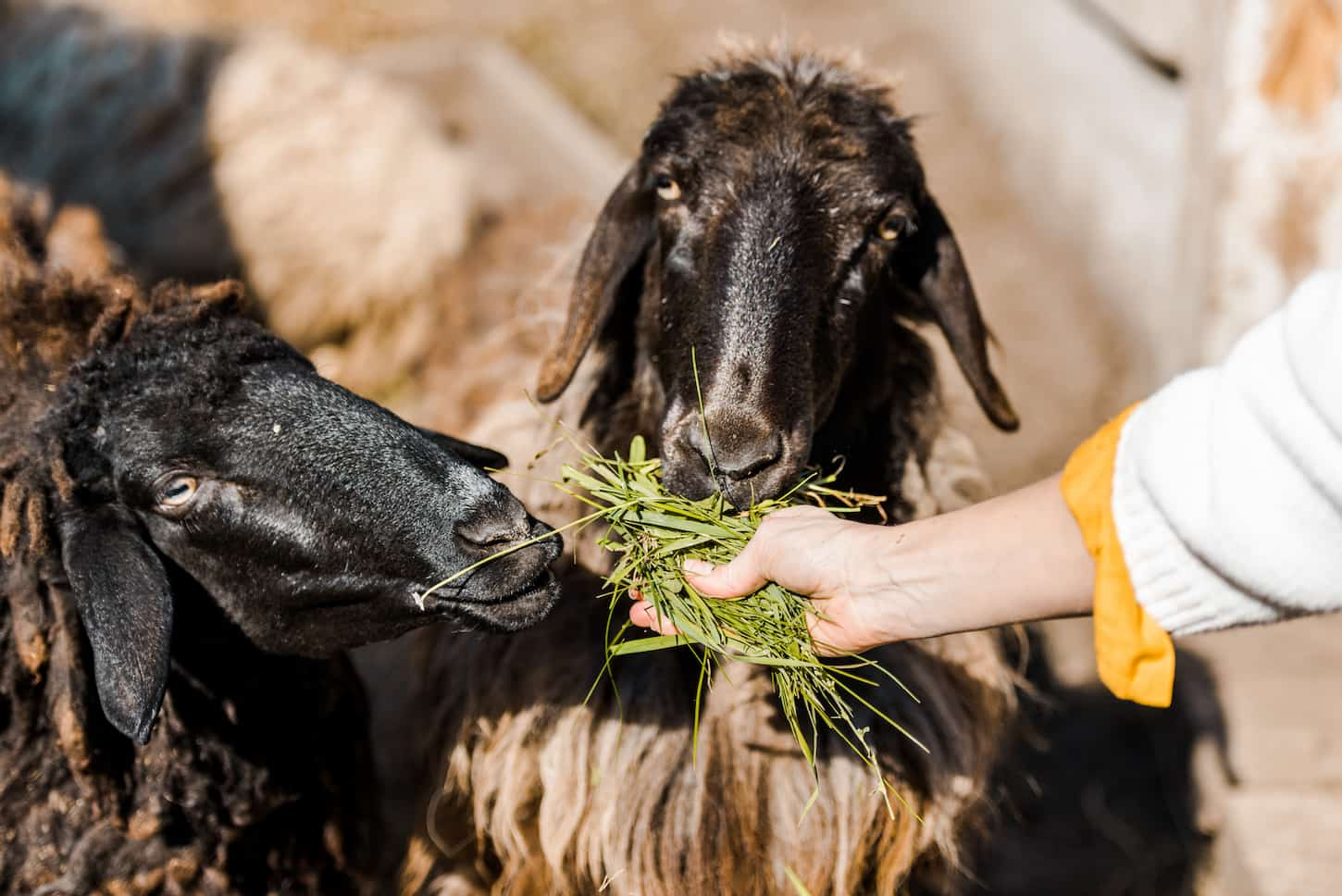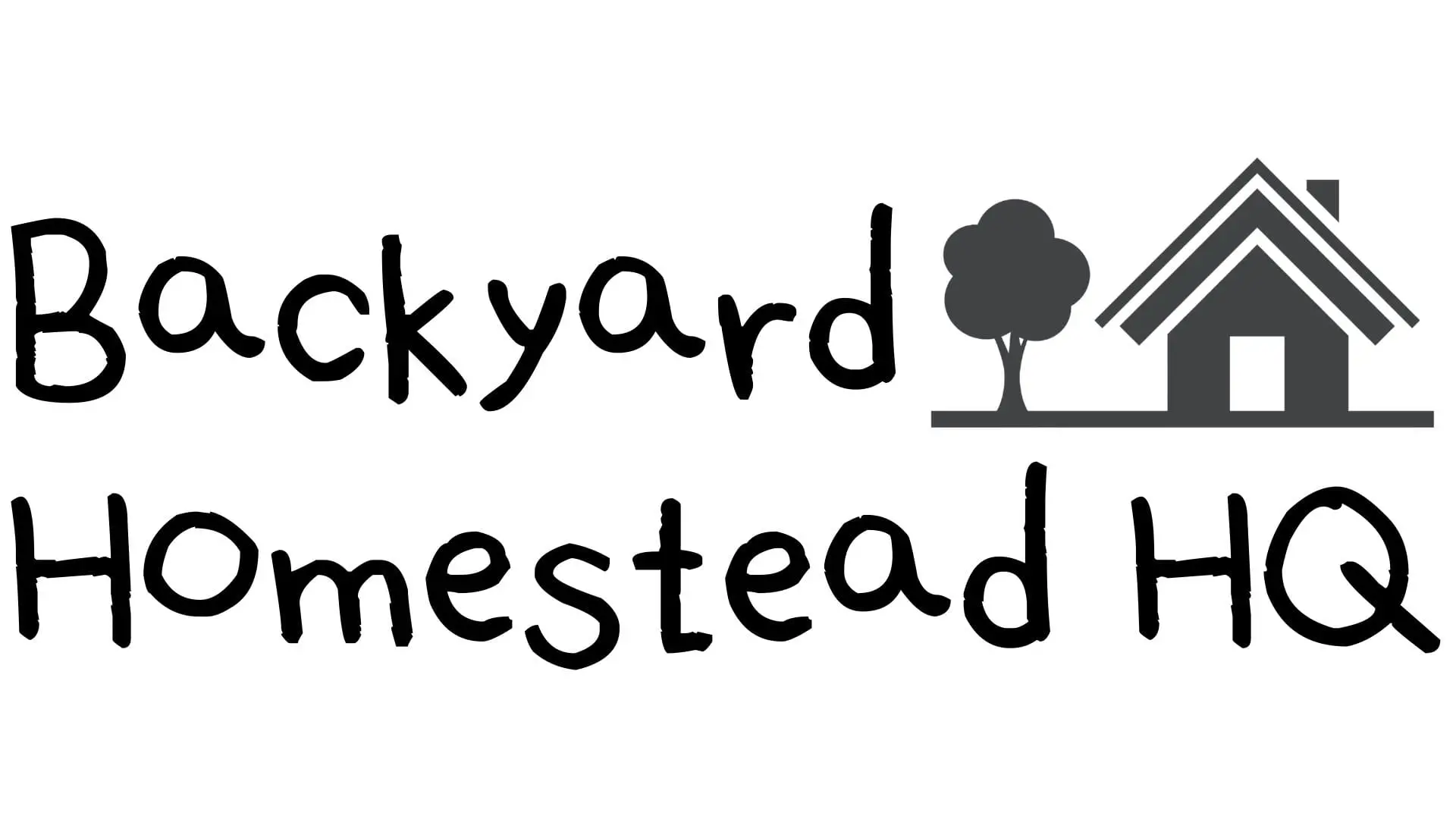We all know sheep as fluffy cloud-like animals, but do you know how chunky a sheep should actually be? If you’re a new sheep owner, doing your research before you come one, or even just a curious sheep fan, then here’s what you need to know about keeping sheep at a healthy weight.
Sheep don’t always know to stop eating and must be portion-controlled on most foods. In certain situations, sheep have even been known to die as a result of overeating. This is especially true when sheep are provided with high-calorie foods such as grains or their favorite types of alfalfa.
Sheep are grazing animals that naturally eat food when it’s available to them. As such you as a farmer need to control their access to food, whether naturally when allowing sheep to graze or by paying close attention to their quantities if you offer higher energy foods such as grains.

Will Sheep Eat themselves to Death?
Sheep have been known to eat themselves to death. They are grazing animals that will eat the food available to them which, if dietarily unsuitable, can be a big problem. Certain medical conditions can also cause sheep to eat until death.
One way in which sheep are vulnerable to overeating is if they are given too easy access to grains, which are higher in short-chain carbohydrates (such as sugars) than a sheep’s natural diet of grass. As such, large quantities of these foods can overload the sheep’s digestive system, which produces large amounts of lactic acid to break them down.
This is mainly due to the sheep’s digestive system. Sheep are what’s known as ruminants, meaning they have four stomachs — a common trait amongst grazing animals such as sheep, cows, and goats. This digestive system is particularly efficient in environments with little access to high-energy foods, as it allows sheep to get the most nutritional value possible from very low-energy foods.
Overeating such foods can cause sheep to develop bloat, which can become fatal. Bloat is probably the most common reason for fatalities among sheep who overeat.
Overfeeding on milk or grain-based foods can also cause an illness known as Enterotoxemia. This illness happens when a bacteria present in the sheep’s stomach (which is normally harmless) has the right conditions to reproduce like crazy – well beyond normal limits. Lambs are particularly susceptible because they haven’t yet built up the natural immunity that sheep get with time.
Can Sheep Eat too Much?
Sheep can eat too much. If the foliage that they graze is too high in calories, or they’re offered high energy substitutes such as grain, then there is a risk of this happening. Overeating can lead to obesity, sicknesses like bloat, and/or death.
When sheep eat their natural diet of grass, they’re very unlikely to be able to eat too much. Overeating is more commonly associated with dietary supplements such as grains or alfalfas. Not all sheep need this kind of extra feed, and in fact, healthy adult sheep might become overfed and overweight if supplied with this kind of diet.
Identifying overweight sheep can be a little tricky, especially when they have thick coats. One recommended way to keep track of the weight of your flock is to use livestock scales whenever possible, and compare them with breed standards.
Of course, once you’ve been keeping sheep for a while you’ll get the hang of how they should look. Then, you’ll be able to look at their backs and ribs and be able to quickly identify which sheep are underweight, just right, or overweight.
But before that, it can be a good idea to consult the opinion of animal professionals such as veterinarians or other farmers to have a good idea of how your sheep to others.
Sheep are generally unlikely to be seriously overweight when kept on a natural grazing diet, but if they’re fed sweeter treats (some hobby owners even feed fruits such as watermelon or too much bread – yes, bread. You can go read about feeding sheep bread in my article here), then this risk will increase.
If they’ve eaten too much and become seriously overweight, then this can cause problems for a sheep such as becoming easily out of breath or uncomfortable when lying down or on its side.
In rare cases, as discussed above, overeating unsuitable foods can cause serious health issues and even death.
What do you Feed a Sheep that won’t eat?
If a sheep won’t eat, it can be fed a higher energy diet in order to maintain a healthy weight. However, animals changing eating habits is a common indication of medical problems. For the best advice possible, consult a veterinarian.
As mentioned above, when a sheep’s stomach encounters food that’s too easy to digest, it becomes overloaded with acid and digestive enzymes, which puts its body out of balance and causes serious health issues.
At best, the sheep will develop a mild case of bloat. In a more worst-case scenario, the sheep will develop severe bloat, scours, and may even die.
The best advice in deciding what to feed a sheep that won’t eat is to get professional help. A veterinarian will be able to work out why the sheep won’t eat, hopefully, fix whatever is causing the issue, and then recommend a suitable diet.
It is difficult to recommend something without knowing the case, as suitable diets may vary dependent on the reason for the sheep not eating. And if you don’t fix that? Then your sheep will just keep not eating an adequate diet. And that’s a sad, downhill road.
Do Sheep ever Stop Eating?
Sheep do stop eating throughout the day normally, taking breaks for other reasons such as resting, chewing a cud, and ruminating. Their active grazing is focused mainly at dawn, in the morning, and at dusk. Sheep that do not ever stop eating are considered abnormal.
They use the other time to chew their cud, digest their food, or sleep. Chewing the cud might be considered a form of eating, as this is the process whereby sheep regurgitate food from the stomach back to the mouth for further chewing to make the digestive process more efficient.
However, sheep certainly don’t spend their whole day destroying foliage as their reputation might suggest!
How Much Food Do Sheep Eat per Day?
Sheep generally need to eat between 1-5% of their body weight in food (grasses and hay) per day, depending on their age and stage of life. For a 100-pound sheep, expect them to eat about 3 pounds of food per day. Sheep also need to eat at least a pound of fiber daily.
Young lambs, sick sheep, and pregnant or nursing ewes will need more feed each day. Sheep may also need more feed during inclement weather.
Sheep that can’t get enough caloric intake from grasses and hay, may need dietary supplementation with grains, alfalfa, or other calorie-rich foods.
How long do Sheep Graze each Day?
The average sheep grazes up to seven hours per day, concentrated around dawn, the morning, and dusk.
This time is actually less than cows, which graze from 8 to 12 hours per day. In between grazing, sheep have to take time to properly digest their food, as well as just simply rest.
The seven hours grazing period is also not one solid block of grazing, but a series of shorter sessions split throughout the day. This means that they can get through a fair amount of food, so you’ll need to make sure that sheep have adequate space to graze!
It’s a common mistake for hobby farmers to underestimate just how much land they need, especially as not all land is as fertile as professional sheep farmers aim for. If in doubt, aim to provide your sheep with more space than you think they’ll need so that they don’t finish up all their foliage!
Key Takeaways on Portion Control for Feeding Sheep
Most sheep aren’t going to overeat – unless you’re letting them have uncontrolled access to rich alfalfa or grains. But if you’ve just got a few sheep in a pasture with a solid fence? Then you’re probably going to be just fine. In fact, you’ll be more at risk of your sheep running out of food from normal-paced eating than anything else.
It’s once your sheep can see alfalfa on the other side of a weak fence or they get access to the grain bucket that the overeating becomes a big, bloat-filled problem.
So make sure that all of your pasture fences are secure. That way, you can keep sheep in and keep predators out.
Then, make sure that any non-grass foods are portion-controlled.
Now, if your sheep eat mostly hay, you still may want to use portion controlling methods so that your sheep don’t spread the hay out and poop on it, destroying it. In other words, don’t let your sheep have access to all the bales at once. Just put out enough hay for a day or two – or a few days if you have to.
Over time, you’ll quickly learn how much food you can put out for your sheep without it getting ruined by weather, curious sheep, or sheep manure.
Because as much as we’d like to think that our sheep can fend for themselves, they do need care. So make sure you read this article I wrote about how long sheep can go without food and water. Because the answer about water especially will surprise you!
Resources
Learning from your own experience is essential, but learning from others is also intelligent. These are the sources used in this article and our research to be more informed as homesteaders.
- “83 Sheep Gorge Themselves to Death; Their Owner May Be Herded Into Court : Animals: Rancher Faces a Misdemeanor Charge after an Employee Allegedly Dumped the Carcasses into a Ditch.” Los Angeles Times, Los Angeles Times, 22 Mar. 1991, www.latimes.com/archives/la-xpm-1991-03-22-me-678-story.html.
- Griffler, Zee. “Daily Diet, Treats, & Supplements For Sheep.” The Open Sanctuary Project, 26 May 2021, opensanctuary.org/article/daily-diet-treats-supplements-for-sheep/.
- Hobby Farmer’s Basic Nutrition for Sheep. Biosecurity Tasmania – Animal Biosecurity and Welfare, Apr. 2021, dpipwe.tas.gov.au/Documents/Sheepfeed.mlc.pdf.
- Pierce, Rebekah. “How to Feed Sheep, What Not to Feed, Cutting Costs, and More.” Morning Chores, 27 Mar. 2020, morningchores.com/feeding-sheep/.
